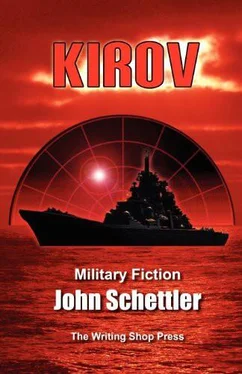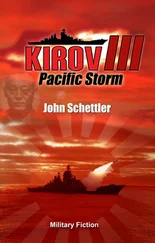John Schettler - Kirov
Здесь есть возможность читать онлайн «John Schettler - Kirov» весь текст электронной книги совершенно бесплатно (целиком полную версию без сокращений). В некоторых случаях можно слушать аудио, скачать через торрент в формате fb2 и присутствует краткое содержание. Жанр: Фантастика и фэнтези, Альтернативная история, на английском языке. Описание произведения, (предисловие) а так же отзывы посетителей доступны на портале библиотеки ЛибКат.
- Название:Kirov
- Автор:
- Жанр:
- Год:неизвестен
- ISBN:нет данных
- Рейтинг книги:5 / 5. Голосов: 1
-
Избранное:Добавить в избранное
- Отзывы:
-
Ваша оценка:
- 100
- 1
- 2
- 3
- 4
- 5
Kirov: краткое содержание, описание и аннотация
Предлагаем к чтению аннотацию, описание, краткое содержание или предисловие (зависит от того, что написал сам автор книги «Kirov»). Если вы не нашли необходимую информацию о книге — напишите в комментариях, мы постараемся отыскать её.
Kirov — читать онлайн бесплатно полную книгу (весь текст) целиком
Ниже представлен текст книги, разбитый по страницам. Система сохранения места последней прочитанной страницы, позволяет с удобством читать онлайн бесплатно книгу «Kirov», без необходимости каждый раз заново искать на чём Вы остановились. Поставьте закладку, и сможете в любой момент перейти на страницу, на которой закончили чтение.
Интервал:
Закладка:
That was the one thing that still bewildered the British intelligence arms. How could the Germans have achieved this level of accuracy and range on the weapon? Everything they had been able to learn about the program indicated that it still relied on a human operator, a man able to see the target and aim or guide the missile in flight. And much of its expected range was delivered by the aircraft that carried it, large German bombers. It’s actual range after firing was very limited, yet this was contradicted by every report gathered thus far from the ships that had been targeted. There had been no sign of any German aircraft near the targets. The reports from ships at sea indicated that the enemy was seeing and targeting them from well beyond the range of optical or even long range radar detection!
Eventually they came round again to the initial sighting of airborne contacts near the German ship in the first days of the encounter. It was then suggested that the Germans might be launching sea planes of the type often carried by cruisers and battleships, and then using these as platforms to spot and vector the weapons in. Bletchley Park suggested they had only to fire the rockets in the general heading of the target, and perhaps the Germans had then rigged some kind of homing device, even a small radar set in the nose of the missile, that would enable it to hit with such precision. It was a remarkably accurate assessment, but equally shocking to think the Germans had made these advances while similar Allied programs remained at rudimentary levels of development.
“We thought that from the very first,” said Brind. “But I’ll be damned. None of our pilots have managed to get a look at these German planes… except for that odd report we got from the weather station on Jan Mayen.”
“You mean that helicopter report?” Even the word sounded odd to Tovey, let alone the concept of a plane without wings. Yet ideas about helicopters had been around since the time of Leonardo da Vinci, and he admitted to the possibility that the Germans had again stolen a march on them and put such an aircraft into service.
Tovey sighed. “First we get news that Tirpitz is on the loose, then Bletchley Park tells us it’s Admiral Scheer, then we think this ship is Graf Zeppelin, and now this… We’ve run out of German ships, Brind. What do we call this one? We don’t miss something on the order of a new ship design. I can excuse the rest. These rockets could have been developed in underground facilities, and kept very hush, hush. But a ship? To have anything like this at sea now the Germans would have had to lay her keel years ago, and you and I both know they only have so many dock yards capable of building a cruiser class ship.”
Brind was clearly perplexed. “There were two ships originally planned in that German carrier program, sir. Ship “B” was contracted, but her hull was never completed. The Germans halted construction on that one and scrapped her just after the war began in September of 1939. We’ve had some inkling they might be trying to convert a cruiser or even a civilian ocean liner to a carrier, but these photos put an end to that speculation. The odd thing is that there hasn’t been a whisper out of Berlin about this business either, sir. You would think they would crow about their engagement with us, or perhaps make some statement regarding this attack on the US task force. I may be climbing out on a limb here, and I apologize for leading you up the bridle path about Graf Zeppelin…”
“Don’t worry about that, Brind. Speak your mind, man.”
“Well sir, this might not be a German ship at all…”
Events were running on, as the ships, American, British and from parts unknown plied through the sea on courses that all seemed to be converging on Newfoundland. The British were worried that the raider would simply turn east and head out into the Atlantic, but a small fishing trawler out of Newfoundland spotted a lone ship on a course due south of the location where Wasp had sunk. Apparently this German captain seemed convinced of his invulnerability, and came boldly on, albeit at a more cautious rate. The trawler estimated the contact speed at twenty knots.
At the time Tovey was some 225 miles to the south, and the American Task Force 16 was 150 miles northwest of his position. Somerville was an equal distance south, and the three forces, steaming for Newfoundland, formed a slowly compressing wall of steel as their courses converged. Then a further report came in from the PBY: amazingly, the enemy ship changed course in a direction no one expected, not east or southeast into the Atlantic, but southwest on a heading that would put it off the coast of Newfoundland in another twenty four hours.
“The gall of that ship,” Tovey exclaimed. “Do they think the Royal Navy has just turned tail and run home?”
“More than likely they’ve got other ideas,” said Brind. “They may have even got wind of this secret meeting.”
“What could they possibly be up to with that heading?” Tovey shook his head.
“It could be a fuel situation,” Brind suggested. “Perhaps they have a tanker hidden away that the Americans failed to spot. The weather has been somewhat grim. Then again…If they do know about the Prime Minister’s meeting, that ship is on a course that will put it in firing range of Argentia Bay given the range of these rockets.”
Tovey raised his eyebrows at that. “Damn,” he said. “Could the Germans have known about this meeting all along? I only learned the details but a few days ago.”
“True, sir, but there it is. The raider would be here tomorrow morning if it holds its present course and speed.” Brind pointed to the map off the northeast cape of Newfoundland. He took up a pair of calipers and neatly drew a circle. “That’s the range we’ve observed on these rockets.” The arc of fire covered the whole of Argentia Bay.
“We’ll have to do something about this, Brind. We can’t very well have Jerry taking pot shots at the Prime Minister, can we? Look here… If we put out the word and make all the speed we can, perhaps we can cover that coastline and herd this raider into the Sea of Labrador. All we have to do is form a line and then sweep north.” Tovey moved his arm, as if stroking a tennis ball and knocking the German ship halfway to Greenland. “We’ve enough ships to cover well over 200 miles. We’ve got her now, Brind. She’s stickling her neck out with this maneuver, and right into our jaws of steel.”
The Admiral could see an opportunity here, and he immediately asked the Prime Minister if he would consider transferring to a fast cruiser, and sail on ahead, well screened and protected by all the ships now gathering in the region. That way he could keep Prince of Wales in hand for the battle he hoped was just hours away now.
Churchill, balked, at first, hoping to stay at sea for the action. “Giving me the bums rush, Admiral?” he complained. “I was hoping to actually see you get your teeth into this German ship.” He was eventually persuaded that this would be most unwise, and the early arrival of the Americans and FDR at Argentia proved a sufficient lure. That decided, the Prime Minister was ferried over to the cruiser Devonshire and, thankfully, Admiral Pound went along as well. Tovey detached three destroyers with them, Echo in the van, and Eclipse and Escapade to either side. Designated Task Force C, the group sped away at all of 34 knots, hastening on toward their fateful rendezvous at Argentia Bay.
This allowed Tovey to take the rest of Home Fleet, including Prince of Wales, northwest on a course that would eventually put him just east of the American Task Force 16. Being informed of the American order of battle, he reasoned that together they would then have sixteen ships, including three battleships, a battlecruiser, five cruisers and seven destroyers-a wall of steel stretching from the coast of Newfoundland some 200 miles out to sea, in a good position to find and smother this enemy raider when they turned north.
Читать дальшеИнтервал:
Закладка:
Похожие книги на «Kirov»
Представляем Вашему вниманию похожие книги на «Kirov» списком для выбора. Мы отобрали схожую по названию и смыслу литературу в надежде предоставить читателям больше вариантов отыскать новые, интересные, ещё непрочитанные произведения.
Обсуждение, отзывы о книге «Kirov» и просто собственные мнения читателей. Оставьте ваши комментарии, напишите, что Вы думаете о произведении, его смысле или главных героях. Укажите что конкретно понравилось, а что нет, и почему Вы так считаете.












